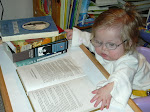My five-year old daughter Zoya was arguing with her cousin Eli (also 5 yeas old) about Jesus. It was getting to be a nasty fight. Zoya, who grew up listening to Bible stories and Papa’s sermons (poor kid…), was adamantly defending historicity of Jesus. He really lived, he really died, he really rose from the dead, she was saying. Eli, raised in an agnostic home, said that Jesus was only in one’s heart. Sounds like the Gnostic controversy, doesn’t it? It shows that such issues are obviously important and that you don’t have to be a 74 year old Greek bishop to grasp their importance. After the adults broke the kids up and encouraged them to be nice to each other even if they disagree, Zoya whispered while walking past Eli: “I’m right.”
We encourage our kids to doubt and figure out the faith on their own. Of course, we create an environment that’s conducive to belief and godliness. We don’t brainwash them and will not be signing them up for Jesus Camp anytime soon. And yet, my 5 year old cute little girl has already succumbed to the most grievous fallacy of the Evangelical Church – judgmentalism. Why do we think that truth gives us the right to be inconsiderate and intolerant? Evangelicals are so excited about truth that they have neglected grace. In fact, a lot of us are quite happy to return grace, get a refund and buy more truth. So, instead of promoting truth by grace, we have hidden it with judgmentalism. One of the fruit of the Spirit is gentleness, which is the opposite of judgmentalism. So, if there is no fruit of the Spirit, can we claim that the Spirit is present? Maybe, a radio news flash was right: 75% of churches are without the Holy Spirit. I’d like to see their research data… The worst thing that I realized as we discussed gentleness in our home group was that I am judgmental towards judgmental Christians. Is there hope?
Thursday, October 4, 2007
Subscribe to:
Post Comments (Atom)

1 comment:
I don't know where their data came from, but I do know that there is research from Allport between 1950 and 1988 that shows people who claim to be the most religious are often the most extrinsic and exhibit lower levels of tolerance, higher levels of predjudice, more feelings of guilt, anxiety, and depression than those who do not claim to have a strong sense of religion in their life. These results have been verified and duplicated a few times, and they are done in an empirical way, with little researcher bias (well as little as can ever be had). There is a more recent study by L.J. Francis et al called primary personality trait correlates of religious practice & orientation. I'm sure you can find som,e abstracts online, or since you are in school, you can probably get the full length article from JSTOR an online journal repository, but you have to have login info from your school library.
Post a Comment